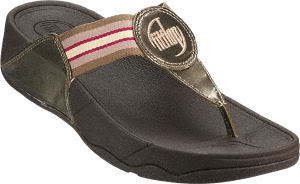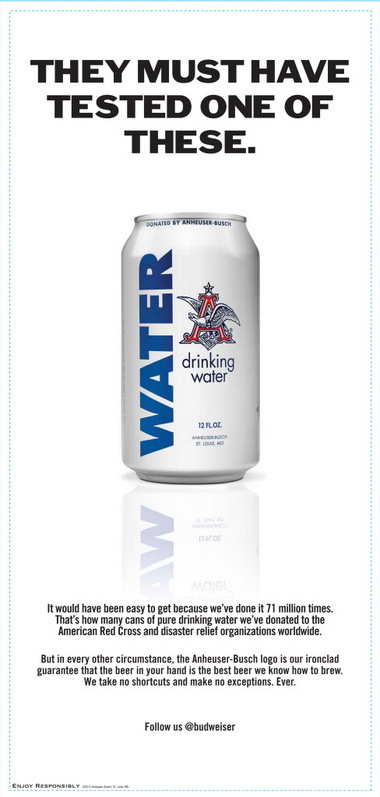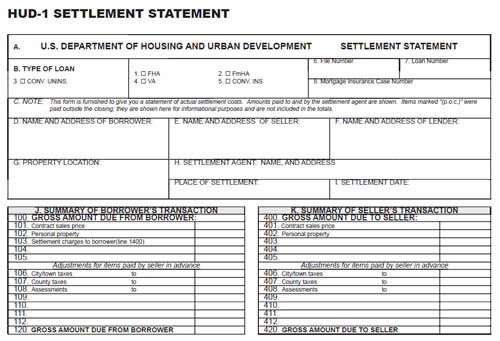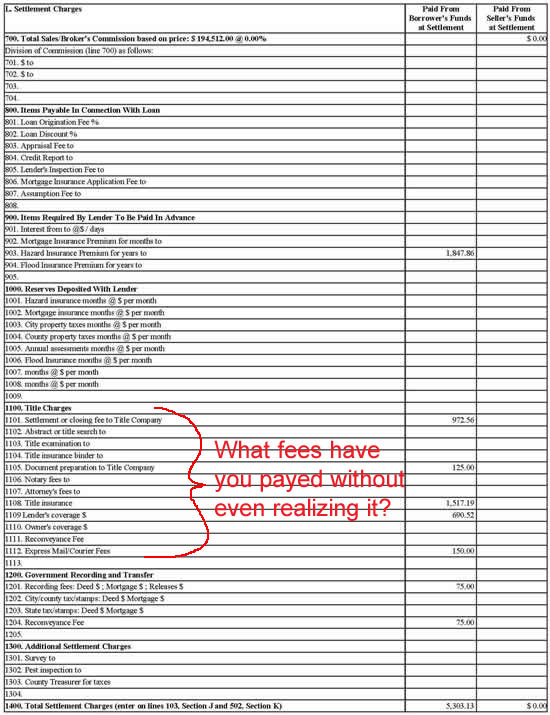Class Action Archive
FitFlops Flop: Class Action Filed Over Flip Flops Gym
April 10th, 2013. By AbiK
 Seriously. If a pair of flip flops has a “gym built in”, can a Jimmy Choo’s diet be far behind? (No, actually—as a quick glance at Jimmy Choo advertising makes it clear they know what business they’re in, and what a pair of stilettos can and cannot do.)
Seriously. If a pair of flip flops has a “gym built in”, can a Jimmy Choo’s diet be far behind? (No, actually—as a quick glance at Jimmy Choo advertising makes it clear they know what business they’re in, and what a pair of stilettos can and cannot do.)
Rhetorical questions aside, first there was the Reebok Toning Shoes class action lawsuit. That one settled for $25M. Then there was Skechers Shape-Ups. That one settled for $45M. And THEN there was New Balance Toning Shoes, which settled for $2.3M.
They say three’s a charm, and I’m sure the lawyers representing FitFlop customer, Barbara Glaberson, 70, of Ventnor, NJ, are well aware that they’ve got footwear trends (at least legally speaking) on their side with three toning shoe defendants having to settle for millions.
According to an article at Philly.com, Glaberson purchased a pair of bronze Walkstar FitFlops sandals for $60 at Nordstrom’s in the spring of 2010. And guess what? After wearing the sandals, she found they didn’t make her fit.
Well, according to one of Glaberson’s lawyers, Timothy G. Blood, a partner in Blood, Hurst & O’Reardon L.L.P. in California, Glaberson “…thought it would be great to get more out of just walking around. They did nothing for her, and she felt like she had been ripped off.”
Gullible though she may have been, when you consider that FitFlops were advertised as “the flip flop with the gym built in” and that they retail at a higher price point, surely they sound like they must do more for you than your average pair of Havaianas, coming in at around $20 retail—and certainly more than the “2 for $5” Old Navy flip flops. Right? Granted, Havaianas and Old Navy flip flops make a better fashion statement, but fashion be damned where there’s calf toning to be had for $60.
So, fast-forward, Glaberson has filed a class action lawsuit, v. FitFlop USA L.L.C., claiming that the FitFlops Walkstar sandals did not, apparently, come with a gym built-in. Nor, I’m guessing, any Nautilus equipment. Nor a treadmill. And they didn’t make her more fit. (On the flip side—no pun—it’s important to note that Glaberson is not claiming physical injury, which had been an aspect of some of the other toning shoe lawsuits that preceded this; she is merely alleging consumer fraud.)
We’ll have to see where this one nets out, but it’s one to watch. As Philly.com points out, both sides have legal representation with some serious klout. On Glaberson’s side, there’s Blood and his partners who have worked with the FTC on the Reebok EasyTone Settlement for $25M. On FitFlops side, there’s William S. Ohlemeyer, a partner with Boies, Schiller & Flexner L.L.P.—the firm that represented Al Gore in the post-election debacle over the outcome of the 2000 presidential race. Stay tuned…
Top 10 Most Ridiculous Claims that led to Lawsuits in 2012
March 19th, 2013. By LucyC
 LawyersandSettlements.com is releasing its list of the Top 10 Most Ridiculous Marketing Claims from consumer fraud lawsuits during the last year.
LawyersandSettlements.com is releasing its list of the Top 10 Most Ridiculous Marketing Claims from consumer fraud lawsuits during the last year.
The alleged false advertising claims found in these ten consumer fraud lawsuits shows the extent to which marketers may go in order to promote their products, as well as the level of consumer savviness that exists in the marketplace. Consumers will clearly check marketers on promotional claims where product performance does not appear to live up to what’s being promised.
Here, our list of most ludicrous marketing claims found in consumer fraud class action lawsuits during 2012:
1. Coty’s Rimmel London Lash Accelerator was the target of a consumer fraud class action in 2012. Filed in federal court in California, the consumer fraud class action lawsuit, entitled Algarin v. Coty Inc., Case No. 12-cv-2868 JAH JMA) alleged that Coty deceives consumers by advertising that Rimmel London Lash Accelerator mascara with Grow-Lash Complex lengthens eyelashes by 37 percent within one month and, with regular use, increases their number. The Rimmel London Lash Accelerator class action lawsuit makes our top 10 list for if the product really did generate that kind of eyelash growth, Coty would likely be facing a personal injury lawsuit resulting from eyelashes restricting visibility.
2. PepsiCo and its subsidiary Frito-Lay also faced the wrath of disgruntled consumers in Markus Wilson v. Frito-Lay North America, Inc. and PepsiCo, Inc., Case No. 12-cv-01586, U.S. District Court, Northern District of California, Oakland Division. The class action lawsuit alleged Frito-Lay misbranded its Lay’s Potato Chips as healthy by claiming they contain “0 grams of Trans Fat,” while not pointing out in advertising that every 50 chips contains more than 13g of fat. Additionally, the lawsuit states Frito-Lay tells consumers “Snacks may benefit special populations including people with diabetes, children and adolescents, older adults, and pregnant women.” Really?
3. Pepperidge Farm faced a deceptive marketing practices lawsuit. In Bolerjack v. Pepperidge Farm, Inc., Case No. 12-cv-2918, U.S. District Court, Colorado (Denver), the lead plaintiffs alleged the company “mistakenly or misleadingly represented that its Cheddar Goldfish Crackers are ‘Natural,’ when in fact, they are not, because they contain Genetically Modified Organisms (GMOs) in the form of soy and/or soy derivatives.” Makes you wonder what part of the name “Cheddar Goldfish Crackers” could possibly imply that they are natural? Think about it.
4. ConAgra Foods Parkay Spray. ConAgra Foods faced a class action lawsuit for allegedly misleading consumers over the fat content of Parkay Spray butter substitute. The Parkay lawsuit, Pamela Sue Trewhitt v. ConAgra Foods, Inc., Class Action Case No. 8:12-cv-00287-JFB-TDT, United States District Court for the District of Nebraska, claimed that ConAgra intentionally misrepresented the contents of Parkay Spray butter substitute as “fat-free” and “calorie-free” when it allegedly contains 832 calories and 93 grams of fat per 8 oz. bottle.
5. Kao Brands, makers of Jergens products saw the legal community championing the consumers’ right-to-know over alleged erroneous claims in the packaging, labeling, marketing, advertising and promotion of Jergens Skin Firming Daily Toning Moisturizer. Among the Jergens false advertising claims alleged in J’lyshae Burns v. Kao USA, Inc., Case No. 12-cv-3261, US District Court, Northern District of California, are that the lotion’s ‘clinically proven to reduce the appearance of cellulite,’ that it will tighten a user’s skin, and produce improved resiliency, elasticity, and firmness.” This one makes the top 10 for if Kao Brands had found a way to “produce” firmness, Jergens Skin Firming Daily Toning Moisturizer would have the attention of the medical community.
6. Dr. Pepper Snapple Group. Another class action lawsuit to come out of the food and beverage industry was the one filed against Dr. Pepper Snapple Group over its 7UP Cherry Antioxidant, 7UP Mixed Berry Antioxidant and Diet 7UP Mixed Berry Antioxidant sodas. The consumer fraud lawsuit, Green v. Dr Pepper Snapple Group Inc., was filed US District Court, Central District of California, No. 12-09567, and alleged that antioxidants contained in the 7UP sodas were falsely stated as being derived from blackberries, cherries, cranberries, pomegranates and raspberries, rather than added Vitamin E.
7. Avon Products, Inc. was hit with a consumer fraud class action lawsuit over its Anew skin care line. At issue, according to the lawsuit entitled Lorena Trujillo v. Avon Products, Inc., Case No. 12-9084, California Central District Court, are alleged false advertising anti-aging claims made by the cosmetic manufacturer regarding its Anew Clinical Advanced Wrinkle Corrector, Anew Reversalist Night Renewal Cream, Anew Reversalist Renewal Serum and Anew Clinical Thermafirm Face Lifting Cream products. Avon is alleged to go as far as to compare the products to “procedures found in a dermatologist’s office” and to claim that these same products can boost collagen, recreate fresh skin and fortify damaged tissue. Even the FDA got in the act on this one–they issued a warning letter indicating that the products have been misrepresented to consumers.
8. Maybelline faced a consumer fraud class action over its “Super Stay” lipstick and lip gloss–allegedly they weren’t staying on as long as promised. The lipstick lawsuit, entitled Carol Leebove, et al. v. Maybelline LLC, Case No. 12-cv-07146, alleged L’Oreal SA, the parent company of Maybelline, falsely advertised the staying power of both the Super Stay lipstick and lip gloss by naming them Super Stay 14HR Lipstick and Super Stay 10HR Stain Gloss. One of the plaintiffs for the lawsuit alleged that the long-lasting lipstick would wear off as soon as she ate a meal or had a drink. The Maybelline lawsuit alleged unjust enrichment, breach of warranty and violations of various consumer-protection laws.
9. Arctic Zero frozen desserts were on the receiving end of a class action lawsuit that alleged the desserts have 46% to 68% more calories than advertised. The Arctic Zero lawsuit, entitled Brenda Freeman v. Arctic Zero, Inc., Case No. 12-cv-2279 L BGS, US District, Southern District of California, alleged the company deceptively labels and markets its frozen treats as having only “150 calories per pint.” It goes on, however, to say the frozen desserts contain up to “68% more calories than advertised based on findings from recent independent laboratory tests performed by EMSL Analytical, Inc.” Specifically at issue in the class action were the Arctic Zero Chocolate Peanut Butter, and Arctic Zero Vanilla Maple which allegedly had 46% more calories than the 150 calories advertised.
10. Chobani Yogurt found itself involved with a consumer fraud class action lawsuit in Kane v. Chobani, Inc., No CV12-02425 (U.S. Dist. Ct., N.D. Cal., San Jose Div., filed May 14, 2012). The lawsuit alleged Chobani Inc. made deceptive marketing claims concerning the use of certain terms on its Greek yogurt products. Specifically, Chobani’s use of “evaporated cane juice’, ‘all natural ingredients’ and ‘only natural ingredients’ as terms to describe the yogurt allegedly failed to disclose that ‘evaporated cane juice’ is commonly referred as sugar or dried cane syrup.
Budweiser Uses Water to Fight Water; Says Whistleblowers Are Confused
March 6th, 2013. By AbiK
So after a few Budweiser class action lawsuits were filed last week over allegations that the King of Beers was selling ‘watered down’ beer, Budweiser took the opportunity to strike back. But rather than just defend itself or call the watered-down beer allegations pure bunk, it tried to get clever. How so? Anheuser Busch ran a full-page ad featuring a picture of Budweiser Water—actual canned water—that the brewer produces for disaster relief efforts.
Here’s the full-page ad:
You Paid WHAT at your Closing? Time to Check your HUD-1 Form…
March 5th, 2013. By AbiK
We’ve had a number of people ask us about real estate fees this week after our story entitled “Illegal California Real Estate Fees Costing Consumers” posted. One of the biggest questions everyone has is this: How do you know—or where do you find out—if you’ve either paid too much in real estate fees, or worse, have been charged a fee illegally?
Anyone who’s bought a home knows that last day—the day when everything is finalized and you get the keys to your new home—is a day fraught with both excitement and the overwhelming sense that you’re signing your life away. If you were completely lucid for even one small moment, you might remember that you signed a form that looked like this—it’s the HUD-1 Settlement Statement that every home buyer signs at the closing:
Unfortunately, while in the throes of signing all the paperwork, who has time to really read every line item? And that’s what’s at the heart of some recent real estate fee investigations in California—some attorneys are investigating potentially illegal real estate fees that homeowners may have paid—without even realizing it—at their closing.
How do you know if you paid any illegal closing costs? Well, it’s best to have an attorney look at your HUD-1 form—you probably have that along with your title and any mortgage documents. But the first place to look on the HUD-1 if you have it, is on page 2 (see image below), under the section called “Title Charges”. Some of the real estate fee investigations have been focusing on things like exorbitant messenger fees. The HUD-1 will also show whether your homeowner’s insurance company is charging more than it is allowed to charge by law.
So, particularly if you bought a home in California, take a look at your HUD-1 form—and if you find anything that you don’t understand or think is questionable, reach out to a California consumer fraud attorney.
Budweiser Watered-Down? That’s just Un-American! (if true)
February 27th, 2013. By AbiK
 Budweiser is taking some heat in the form of a class action lawsuit alleging that the most American of American beer brewers adds water to its beer thereby reducing the alcohol content by three to eight percent compared to what’s indicated on its beer label (and yes, I know Bud merged with Belgian In-Bev, but it will always be the iconic American beer).
Budweiser is taking some heat in the form of a class action lawsuit alleging that the most American of American beer brewers adds water to its beer thereby reducing the alcohol content by three to eight percent compared to what’s indicated on its beer label (and yes, I know Bud merged with Belgian In-Bev, but it will always be the iconic American beer).
If the allegations are true, it puts into question everything the red, white and blue stands for: honesty, hard work, integrity, and a nice cold brew as reward for it all. Hell, those Clydesdales have continued to unite us all in red-blooded pride each holiday season—what with their showing up every winter on our t.v. screens, tugging at our heartstrings better than the best Hallmark card could.
Gosh darnit where’s that House Committee on Un-American Activities when you need them?
Now what’s interesting with the Budweiser class action lawsuit here is that the folks who filed the lawsuit are not the ones you’d expect. C’mon—when you hear someone’s suing a beer company because they’re thinking there ain’t the right amount of alcohol in their beer, you’re thinking of some beer-loving redneck, right? Wrong.
The folks that filed the Budweiser class action are Budweiser employees. And, according to a report from MSN, some are “in high-level plant positions”. They ought to know.
The MSN article quotes lead attorney Josh Boxer as stating, “Our information comes from former employees at Anheuser-Busch, who have informed us that as a matter of corporate practice, all of their products mentioned (in the lawsuit) are watered down. It’s a simple cost-saving measure, and it’s very significant.”
According to the lawsuit, the deceptive practice and false advertising began after the 2008 merger between Anheuser-Busch and In-Bev. The lawsuit states, “Following the merger, AB vigorously accelerated the deceptive practices described below, sacrificing the quality products once produced by Anheuser-Busch in order to reduce costs.”
The lawsuit, filed in California, Pennsylvania and additional states including one due this week in New Jersey, involve ten Anheuser-Busch beers: Budweiser, Bud Ice, Bud Light Platinum, Michelob, Michelob Ultra, Hurricane High Gravity Lager, King Cobra, Busch Ice, Natural Ice and Bud Light Lime. Each lawsuit is seeking at least $5 million in damages.
We’ll keep an eye on this one as not only is it nation-wide, but it also involves “insider info” (always making for good story line) and the most iconic American beer for heaven’s sake!
Archive by Category
- Accidents (24)
- Airlines (9)
- Asbestos Mesothelioma (262)
- Automotive (25)
- Celebrity (14)
- Class Action (84)
- Complaints/Comments (15)
- Consumer Fraud (84)
- Contest (2)
- Court of Public Opinion (5)
- Crazy Sh*t Lawyers See (61)
- Criminal Law (4)
- Defective Products (111)
- DePuy ASR Hip Recall (2)
- Discrimination (22)
- Drugs/Medical (248)
- Elder Care Abuse (4)
- Emerging Issues (462)
- Employment (54)
- Environment (52)
- Financial (28)
- Food Illness (15)
- Human/Civil Rights (4)
- Insecurities (5)
- Insurance (16)
- Intellectual Property (16)
- Internet/E-commerce (19)
- lawsuits (161)
- Lawyers (20)
- Lawyers Giving Back (43)
- Lex Levity (10)
- Personal Injury (106)
- Pleading Ignorance (53)
- Real Estate (2)
- Recall (6)
- Scam (3)
- Securities (13)
- Settlement (81)
- Tort Reform (2)
- Totally Tortelicious (81)
- Veterans (11)
- Whistleblower (9)


